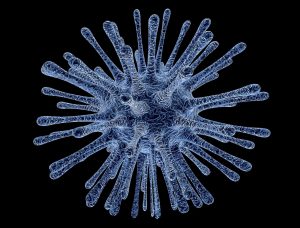 The word virus strikes panic into most people. We have grown up in an atmosphere of fear surrounding anything viral: influenza, HIV, herpes, cancer, and—most recently—the coronavirus. Yet science is beginning to rethink and remap everything we thought we knew about one of the deadliest scourges on the planet. Turns out, we may not have quite the right idea about viruses.
The word virus strikes panic into most people. We have grown up in an atmosphere of fear surrounding anything viral: influenza, HIV, herpes, cancer, and—most recently—the coronavirus. Yet science is beginning to rethink and remap everything we thought we knew about one of the deadliest scourges on the planet. Turns out, we may not have quite the right idea about viruses.
Virus: Friend or Foe?
Given the vast amount of microbes—viruses included—in our microbiome, it should come as no surprise that a growing body of research is confirming the symbiotic place of viruses in the human biome. A groundbreaking study flies in the face of our century-old assumption that viruses are Black Riders bringing sickness and death. The researchers found that “MNV infection offset the deleterious effect of treatment with antibiotics in models of intestinal injury and pathogenic bacterial infection. These data indicate that eukaryotic viruses have the capacity to support intestinal homeostasis and shape mucosal immunity, similarly to commensal bacteria.”
There can be no doubt that the reputation of viruses is changing when Science Daily’s headline on this study says Bacterial Microbiome Move Over: the Gut Virome Makes Its Debut, and then goes on to say that “the new findings are the first strong evidence that viruses in the gastrointestinal tract can help maintain health and heal a damaged gut.”
This alone makes a pretty compelling case that viruses have a commensal relationship with us. But there’s more.
Not Even Alive
A 2015 study showed that virus DNA—viral nucleic acids—are not even alive and depend on other components (virions)—proteins, lipids, and extra-viral nucleic acids—to be mobile or infectious. These virions that allow the virus to be active are made up of biological material from the host that the virus “infects.” How, then, can we honestly label an influenza virus as a completely outside invader since its virility is dependent upon critical material that must be provided by our own bodies?
With this knowledge in hand, one could see how our body environment could be an important factor in determining whether a virus generates disease symptoms in us or not. A virus must find essential conditions existing in a body before it can cause the slightest harm.
“In a state of health the body is closed against the action of disease germs.”
– Louis Pasteur
Virus-like Structures Discovered
As seen above, we share our bodies with viruses in what scientists are calling the virome. Even more interesting, researchers have found little intercellular virus-like structures everywhere in our bodies that they call exosomes. These are so close to viruses—the same size and everything—that it is hard to tell them apart. Exosomes are carriers of RNA and are essential for regulating the expression of the vast majority of the human genome.
We Are Virally Codependent
An emerging body of literature seems to be confirming that both exosomes and viruses not only serve the function of communicating within an organism but also seem to be a mechanism through which plants and animals talk to each other, transferring vital information between organisms and species. Research released in 2014 showed that the exosomes in a piece of fruit can change the expression of crucial genes in our bodies. We are entering a post-Germ Theory world where viruses not only increase immunity and promote homeostasis in the body but also join exosomes in the crucial capacity of information carrier.
One thing is certain, we can no longer palm the virus off as only a villain. It is becoming more and more clear that viruses facilitate our adaption and survival on this planet.
Enemy Mine
Our century-long battle against viruses may end up a lot like the mid-1980s sci-fi drama, Enemy Mine. We may discover that we need each other to survive. What a novel revelation, aye? Ancient spiritual leaders and holy books, like the Bible, have been saying that for millennia. Heck, nature has been trying to tell us that from the dawn of time. It seems that mankind are pretty slow learners.
Could something as “evil” as a virus be our friend? Oh, the irony! Perhaps it’s a virus, instead of a vaccine, that has been our guardian and healer all along.
